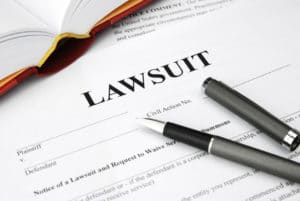
Most personal injury cases settle before a lawsuit is filed. However, some cases cannot be settled through mediation or negotiation. Those cases may need to go to trial to resolve the dispute.
An injury victim might file a personal injury suit against a negligent party who caused their accident. The parties may argue about the division of liability under comparative fault. Alternatively, a party might need to file a lawsuit if the statute of limitations is about to expire.
There could also be disputes related to the value of an injury victim’s economic and non-economic damages. Insurance companies may decide to go to trial when they believe the victim is demanding more money than the personal injury case is worth. In some cases, the insurance provider may believe that it can win the case regardless of the evidence.
Table of Contents
What Happens After a Personal Injury Lawsuit is Filed?

If your attorney files a personal injury lawsuit, the case will go through several phases before trial. One of the longest phases is the discovery phase.
During the discovery phase, each party gathers information and evidence to build their case. Incidentally, this evidence is also called “discovery.”
Parties in a lawsuit can obtain discovery from each other. They can also use a variety of discovery tools to gather evidence from third parties not named in the case. Rule 26 of the Federal Rules of Civil Procedure sets forth the duty to disclose specific information in a case. In addition, there may be local and state rules that also govern discovery in civil cases.
What is a Discovery Request?
Common methods of discovery in a personal injury case include:
Interrogatories
Interrogatories are a list of questions posed by one party to the opposing party. The party receiving the interrogatories must answer each question under oath.
Parties use interrogatories to obtain evidence of their claim. This type of discovery can be beneficial when analyzing the strengths and weaknesses of the opposing party’s evidence.
Requests For Production of Documents
You may request documents related to the case from the other party. The other party must provide copies of the documents or make the documents available for inspection and copying. The party must certify under oath that the responses are accurate and complete.
If the plaintiff or the defendant desires to obtain documents from a party not subject to the lawsuit, they must use a subpoena.
Depositions
Depositions are common discovery tools in a personal injury case. In most cases, the attorneys for both parties will depose the opposing party.
During a deposition, the attorney questions the party or witness under oath. A court reporter records the deposition and transcribes it word-for-word. The sealed deposition could be used in court to question a witness who tries to change their testimony.
Depositions are also used to obtain testimony from expert witnesses, eyewitnesses, and other parties who might have information related to the case, such as physicians and therapists.
Requests for Admissions
Requests for admissions are similar to interrogatories. However, instead of questions, the request contains statements.
The opposing party must admit or deny each of the statements. The responses are provided under oath.
Requests for admissions can be used to narrow the disputed issues in a case. Then, by agreeing on specific facts, the parties can focus on resolving the disputed matters.
Can My Personal Injury Lawsuit Settle Before Trial?
Yes, many lawsuits settle after the discovery phase. The parties use the information gathered from discovery to re-evaluate the strength of their case.
The insurance company may decide that your evidence is strong enough to convince a jury that its insured was at fault for the cause of the accident. If so, the insurance company may decide to settle the case instead of risking a trial.
Likewise, your attorney may identify weaknesses in your case that could raise doubts for jury members. In that case, you might be willing to accept a slightly lower settlement amount to avoid losing your case in court.
The parties may negotiate directly with each other or they may enter mediation. If the case does not settle, it will go to court. There may be pretrial motions before the case goes to trial. At trial, both parties present their evidence.
The jury decides the case based on the evidence. If either party is not satisfied with the verdict, they may file an appeal.
Contact Our Boca Raton Personal Injury Attorney for a Free Consultation
If another party caused your injury, you could be entitled to compensation for your damages. Contact our Boca Raton personal injury attorney to schedule a free consultation to discuss your case. Our legal team is here to help you as you continue to recover after a tragic accident or injury.
